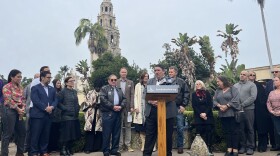

Ayad Allawi, the first Iraqi prime minister following the overthrow of Saddam Hussein, has warned in recent weeks of coming disaster in Iraq.
His warnings come as current Iraqi Prime Minister Nouri al-Maliki is planning a crisis conference aimed at achieving a compromise among the major ethnic, religious and political factions that sit in the parliament.
Seventeen Cabinet ministers have made steps against Maliki's government : 12 twelve have withdrawn from the government, including six from the Sunni Accordance Front and six from Moqtada al Sadr's Shiite group; and five ministers from Allawi's group, including both Sunnis and Shiites, are boycotting the Cabinet.
Allawi, now in Jordan, is a one-time Baathist who turned against the old regime, went into exile and became an ally of the United States.
In an interview with Robert Siegel, Allawi discusses the prospects for reconciliation, and the Iraqi government's future.
When people read things that you have said, such as "Iraq is slipping into more chaos" or "The country is on the verge of a big disaster," they've got to ask themselves, how much more chaotic and disastrous can things get in Iraq? What's your answer?
Unfortunately, there are things yet to come. The country is on a slipping road towards more and more chaos and violence. And we cannot see the end of the tunnel, the light to bring Iraq out of this mess. Sectarianism still prevails. Terrorism is still rife in the country and infiltrating the country all the time. The army, the police are riddled with militias, and every day there are a hundred, almost just over a hundred people killed.
Can Prime Minister al-Maliki actually achieve the grand political compromise he's looking for in his crisis conference, or do you regard him and the fact that he is the prime minister as part of the problem?
Well, in fact, the whole situation is based on sectarianism and is anti-reconciliation. And that's why he is part of this system. I think the whole system ought to be changed, and a nonsectarian regime should prevail.
You're saying, if I understand you — and you're speaking as a Shiite Muslim yourself — but you're saying that Prime Minister al-Maliki, by representing a Shiite party that's allied to other Shiite voices, you're saying that's part of the problem, that's what's creating this?
...Absolutely. It is part of the problem. We have two problems currently prevailing in Iraq. We have sectarianism, including terrorism, and we have the negative intervention and interferences from Iran.
Well, is the current political crisis in Baghdad, then, something that Prime Minister al-Maliki can even conceivably resolve or is the solution an entirely new government?
I think the system ought to be re-examined. I think, unfortunately, Maliki is part of a sectarian system which is influencing and affecting the country negatively. And we cannot see recovery — political recovery, that is to say — if this sectarian system remains operational in the country.
You've expressed your concern about growing influence of Iran in Iraq. First of all, I'd like you to give an example of what is a sign of that, as you would see it, negative influence, and what are you hearing, say, in Jordan from Jordanians about that?
No, the negative influence you are witnessing, for example, a veto on myself in the most recent Sharm el-Sheik meeting, saying that Allawi is not acceptable, this is gross interference. [Iranian President Mahmoud] Ahmadinejad yesterday called all the — the day before yesterday, in fact — all those democratically opposing Maliki and the system as evil forces in Iraq, and this is again in the presence of Maliki. It's unacceptable, it's degrading to Iraq, it's insulting to the region and it's insulting to all democratic and peace-loving countries.
You say you've been effectively blacklisted by the Iranians from being part of the government.
Yes, that is correct.
In the meantime, have you been invited to the crisis conference and will you attend?
Unfortunately, no, I haven't received an invitation from the government of Iraq, and that's why I don't think I'll be going.
And looking ahead to September, when we expect reports from Gen. [David] Petraeus and Ambassador [Ryan] Crocker in Washington — reports on what progress has been made — do you regard that as an important milestone ahead for the U.S. involvement in Iraq?
Well, I think it's an important milestone ... definitely. I have a lot of faith in Gen. Petraeus. But as I've said, the problem in Iraq is not military, it's political. Without political solutions, nothing is going to happen.
A cynic, though, hearing what you're suggesting, might say, "Yes, if only Iraq had the political culture of Denmark, everything would be OK. You'd be able to negotiate a different kind of political system." You don't. That's not your country.
No. ... You know, the process of reconciliation, this is part of the benchmarks, and we hope now with the expanded role of the United Nations that such a reconciliation will take place. It has been overdue, but we look to the future ... All of us Iraqis should take advantage of the surge, of the presence of the United States and the international community to bring about genuine reconciliation in the country. Without this, nothing is going to happen, no security will prevail and violence will remain.
This transcript includes minor edits for clarity.
Copyright 2022 NPR. To see more, visit https://www.npr.org. 9(MDAzMjM2NDYzMDEyMzc1Njk5NjAxNzY3OQ001))





